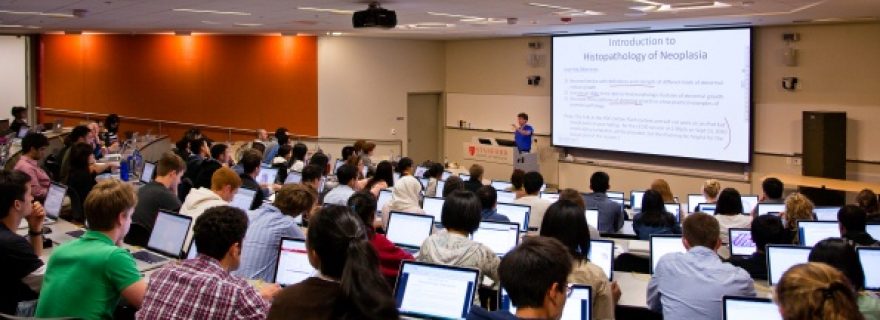Leave your laptop at home!
In this digital age of iPad schools, Facebook communities and trending topics, students more and more use their laptops to take notes during lectures. Recent research has shown that this has a bad influence on their knowledge acquisition.
Laptops in the classroom: What's the problem?
In my lectures I see more and more students using laptops, tablets, or iPads to take notes. Although I sometimes wonder whether they are really so intrigued by my lectures and their notes or whether they secretly train their troops for Clash of Clans while listening to me, I have no problem with it.
However, students may have a problem, and they might need to rethink using their laptops during lectures. However entertaining laptops might be, I recently read a blogpost about research on how the use of laptops for taking notes during lectures affects students’ learning performance. The outcome was not good.
'Laptop students' process less
The researchers compared students who made handwritten notes on paper with students who made notes on their laptops. Both groups had to listen to the same lecture, and were tested on their knowledge 30 minutes after the lecture. The ‘handwritten’ or ‘laptop’ students did not differ in the amount of factual knowledge they recalled. However, students who typed their notes on their laptops did worse in conceptual learning, which needs a deeper understanding and for which students need to be able to make conceptual links between different parts of knowledge. They knew the same stuff, but understood it less well. As a comparison: those who take notes on their laptops may know as much of the parts of the human body as those who take handwritten notes, but they have a harder time understanding how these parts work together in a body.
When the researchers did a second study in which they tested the students in an exam a week after the lecture, those who took handwritten notes outperformed those who typed their notes on a laptop on both factual recall and conceptual learning.
Summarizing and paraphrasing
The explanation of the researchers was that typing notes on a laptop is a type of relatively mindless information processing, in which students take copious verbatim notes without giving the lecturer’s text much thought. Those who take handwritten notes do not have the time to literally write down what the lecturer says, and as a result need to summarize and paraphrase the lecturer’s text, which forces them to think more deeply about the things they hear, which increases their conceptual knowledge of the topic.
The multi-task temptation
In another study, a few years ago, the effect of multitasking in lectures by students using laptops was investigated. In two studies, students who were multitasking by listening to lectures and browsing the internet were tested on their recall. The results showed that browsing the internet during lectures, especially in long sessions —even on lecture-relevant topics—, led to lower grades. Multi-tasking during lectures seems to be a bad idea.
Back to handwritten notes
So, my conclusion is not that you should throw your laptop out of the window -- there is plenty of research showing that using a laptop can help learning. I do suggest leaving your laptop at home when you go to a lecture. Taking your laptop to a lecture may result in mindless typing out whatever the lecturer says, and the entertaining distraction that your laptop offers will also hinder your learning. Take old-fashioned handwritten notes during the lectures—try a fountain pen for the traditional, vintage feel—and transfer these notes to your laptop when you get home.





